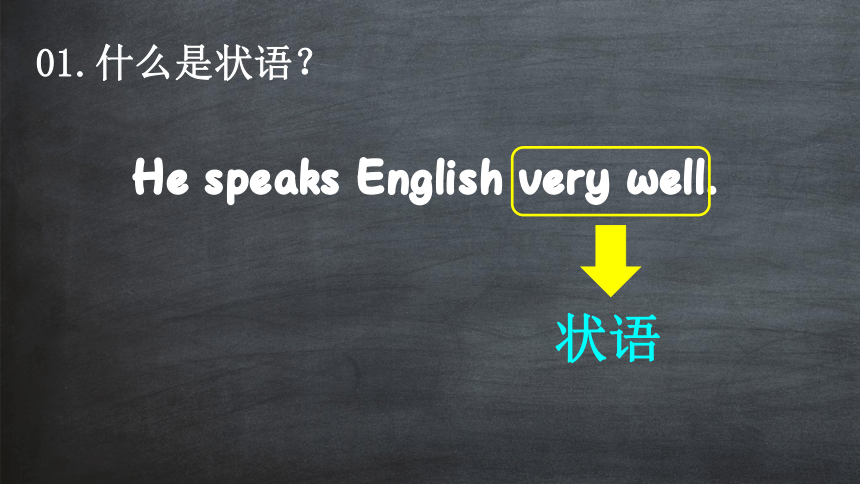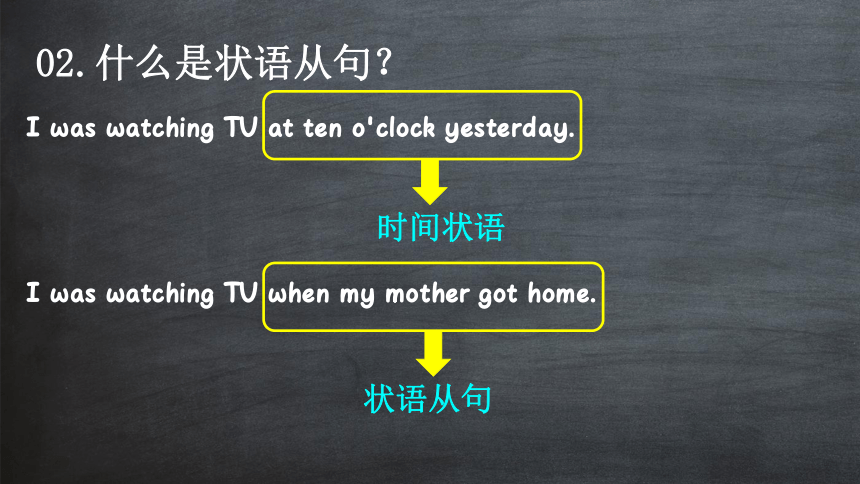2021年中考英语二轮语法专题复习:状语从句复习课件(49张PPT)
文档属性
| 名称 | 2021年中考英语二轮语法专题复习:状语从句复习课件(49张PPT) |  | |
| 格式 | pptx | ||
| 文件大小 | 3.4MB | ||
| 资源类型 | 教案 | ||
| 版本资源 | 人教新目标(Go for it)版 | ||
| 科目 | 英语 | ||
| 更新时间 | 2021-05-05 06:53:44 | ||
图片预览





文档简介
I was doing my homework whem my mother came in.
If it rains tomorrow,we will not go to the park.
过去进行时
主将从现
状语从句
01.什么是状语?
He speaks English very well.
状语
状语是
用来修饰动词、形容词、副词的成分。
说明时间、地点、原因、目的、结果、条件等。
可作状语的有:名词、副词、介词短语、不定式短语
和从句等。
02.什么是状语从句?
I was watching TV at ten o'clock yesterday.
I was watching TV when my mother got home.
时间状语
状语从句
在复合句中
一个句子充当状语成分
那个句子就是
状语从句
Jim joined the army in 1989.
Jim joined the army when he was 20.
He picked up some French words in Paris.
He picked up some French words when he was in Paris.
I will help you if you ask me.
He wears a T-shirt though it is cold.
地点状语从句
原因状语从句
条件状语从句
时间状语从句
结果状语从句
让步状语从句
比较/方式状语从句
目的状语从句
时间状语从句
{5C22544A-7EE6-4342-B048-85BDC9FD1C3A}when
当...时候
after
在...之后
as
当...时候
since
自...以来
一边...一边...
as soon as
一...就...
while
当...时候
not...until
直到...才
before
在...之前
until/till
直到...时
由when引导
When I came into the room, he was writing a letter.
We shall go there when we are free.
I feel very happy when you come to see me.
When you are crossing the street, you must be careful.
I will visit my good friend when I arrive.
Someone knocked at the door when I was sleeping.
When he came home, I was cooking dinner.
When “当……的时候”
1.既可接时间段,也可接时间点
2.从句中既可用延续性动词,又可用非延续性动词
3.动作既可和主句的动作同时发生,又可在主句的动作之前或之后发生
Tom was watching TV while his wife was cooking.
They went out while it was raining.
while 意为“当……时”“在……期间”,
引导的时间状语从句中,主句和从句的动作在同一时期发生,常用延续性动词。
由while引导
He was writing as I was reading.
As I got on the bus, he got off.
The students were talking as the teacher came in.
As the sun rose the fog disappeared.
He smiled as he passed.
Helen heard the story as she washed.
由as引导
As “当……时候”“随着……”
既可接一个具体的时间点,又可接一段时间
主句和从句中动作同时发生,或同时持续。
可用一个进行时,一个一般时或都一般时。
一个动作发生在另一个动作的持续过程中。
Be a pupil before you become a teacher.
He arrived after the game started.
We cleaned the classroom before we left school yesterday.
He called me after he had finished his work.
由before和after引导
before表示在…之前。
after表示在...之后。
We waited till (until) he came back.
She didn't stop working until eleven o'clock.
He didn't go to bed until he finished his homework.
Until you get back,I will sit here.
Don't leave until/till I arrive.
由till和untill引导
till 表示主句动词是持续性动作,常用肯定式,
表示“直到…为止”。亦可用until替换。
until 表示主句动词是瞬间动词,常用否定式,
表示“直到…才”“在…以前不”,
常用于从句句首表示强调。
I have worked for this company since I graduated.
Great changes have taken place since you left this city.
I have returned home twice since I settled down inthe US.
He has written to me frequently since he was ill.
As soon as he heard the news,he jumpe for joy.
I will go with you as soon as I finish my work.
由since和as soon as引导
as soon as 引导的从句表示从句的动作一发生,主句的动作随即发生,常译为“一......就.......”。该句经常用一般现在时表示将来。
since 引导的时间状语从句,表示“自......以来”,主句用一般现在时或现在完成时,从句用一般过去时。
地点状语从句
{5C22544A-7EE6-4342-B048-85BDC9FD1C3A}where
...地方
wherever
任何地方
We lived where the road crosses the river.
由where引导
由wherever引导
Make marks wherever you have questions.
原因状语从句
{5C22544A-7EE6-4342-B048-85BDC9FD1C3A}because
因为
since
既然,由于
as
由于
I came back late yesterday because I was on duty.
He took off his coat because it was too hot in the room.
由because引导
表示造成某种情况的直接原因,语气最强,常用来回答why提问的问句。
Since you come,wait for more time please.
Since everyone is here, let's begin our meeting.
Since you won't help me ,I will ask someone else.
由since引导
表示众所周知的原因,意为”既然“,”由于“
since从句通常位于主句之前,其语气比because弱,比as稍强。
It is diffcult to know what to do,as we are not his parents.
As I didn't know how to do it, I asked the teacher.
As you were out, I left a message for you.
由as引导
意思为“由于”表示原因时,语气比because和since都弱
since从句通常位于主句之前之后都可。
目的状语从句
{5C22544A-7EE6-4342-B048-85BDC9FD1C3A}so that
为的是,以便于
in order that
为的是,以便于
Speak londer so that the people can hear you.
She dresses like an angel so that everyone will notice her.
I shall write down your number so that I may not forget it.
We worked harder in order that the task might be finished in a week.
I hurried through my work in order that I could be in time for TV.
由so that和in order that引导
目的状语从句中常用情态动词may (might), can (could), should 等放在动词之前,从句往往放在主句之后。
结果状语从句
{5C22544A-7EE6-4342-B048-85BDC9FD1C3A}so that
以至于
so...that
如此......以至于
such...that
如此......以至于
We arrived early in the morning,so that we caught the first train.
We moved to the country,so that we were away from the noisy city.
We turned up the radio, so that everyone heard the news.
由so that引导
so that前有逗号为结果状语从句。that有时候可省略
由so......that引导
It was so cold outside that we had to stop the game.
He drove so carelessly that he almost lost his life.
He got so little money that his family had to live on welfare.
He made so many mistakes that he failed the exam once again.
He was so excited that he couldn't say a word.
It is so easy a question that I can work it out immediately.
so......that “如此以至于”有以下几个句型。
1.so+形容词+that. . .
2.so+副词+that. . .
3.so+many/few/much/little+相应形式的名词+that. . .
4.so十形容词十a/an十可数名词单数+that.
由such......that引导
1.It was such a terrible day that none of us would find an excuse for going out to play.
2.Miss Zhao is such a kind teacher that we all like her.
3.They are such good children that we all love them.
4.This was such fine music that it was worth listening to twice.
5.We had such bad weather that we couldn't go out.
such......that “如此以至于”有以下几个句型。
1.such+a/an+形容词十可数名词单数+that. . .
2.such十形容词十可数名词复数+that. . .
3.such十形容词十不可数名词+that. . .
条件状语从句
{5C22544A-7EE6-4342-B048-85BDC9FD1C3A}if
以至于
unless
如此......以至于
as/so long as
如此......以至于
由if/unless/as long as/so long as引导
We shall go there tomorrow unless it rains.(下面为同义句)
We will go there tomorrow if it doesn't rain.
As long as we study hard, we are certain to pass the exam.
Father tole me if I worked hard,he would buy me a car.
unless从句的谓语只能用肯定式。
unless和if…not同义,unless是书面语,if…not是口语,通常二者可以换用。
If引导的条件状语从句的时态:主将从现
在条件句从句中,用一般现在时代替一般将来时,一般过去时代替过去将来时
让步状语从句
{5C22544A-7EE6-4342-B048-85BDC9FD1C3A}though/although
虽然,尽管
even thought
即使,纵使
even if
即使,纵使
as
尽管,虽然,即使
由though/although引导
在句子中一般用了though/although就不能再用but,
但可以与yet或still连用。
though / although意义相同,
用法基本一样,前者通俗,口语化,后者正式,多放主句的前面。
Although/Thoughhe was over sixty, (yet) he began to learn French.
由even though/even if引导
I'll go even if/though it rains tomorrow.
even if 和even though的意思为“即使”“纵使”有退一步设想的意味, 多用于书面语中。
由as引导
Child as he is , he knows a lot.
Though/Although he is a child , he knows a lot.
Old as he is , he studies English every day.
Though/Although he is old, he studies English every day.
as引出的状语从句多用于书面语,它比用though或although引导的从句语气强,更有表现力,从句常放在句首,语序部分倒装。
练习 :
1. I’ll write to you _______ I get there.
A. while
B. before
C. as soon as
D. by
2. He has lived in the city _________ he came back from America.
A. when
B. before
C. since
D. after
3. We won't leave here _______ our teacher comes back.
A. until
B. since
C. after
D. as soon as
4. I had to finish the picture ________ my mother came back.
A. until
B. before
C. after
D. while
If it rains tomorrow,we will not go to the park.
过去进行时
主将从现
状语从句
01.什么是状语?
He speaks English very well.
状语
状语是
用来修饰动词、形容词、副词的成分。
说明时间、地点、原因、目的、结果、条件等。
可作状语的有:名词、副词、介词短语、不定式短语
和从句等。
02.什么是状语从句?
I was watching TV at ten o'clock yesterday.
I was watching TV when my mother got home.
时间状语
状语从句
在复合句中
一个句子充当状语成分
那个句子就是
状语从句
Jim joined the army in 1989.
Jim joined the army when he was 20.
He picked up some French words in Paris.
He picked up some French words when he was in Paris.
I will help you if you ask me.
He wears a T-shirt though it is cold.
地点状语从句
原因状语从句
条件状语从句
时间状语从句
结果状语从句
让步状语从句
比较/方式状语从句
目的状语从句
时间状语从句
{5C22544A-7EE6-4342-B048-85BDC9FD1C3A}when
当...时候
after
在...之后
as
当...时候
since
自...以来
一边...一边...
as soon as
一...就...
while
当...时候
not...until
直到...才
before
在...之前
until/till
直到...时
由when引导
When I came into the room, he was writing a letter.
We shall go there when we are free.
I feel very happy when you come to see me.
When you are crossing the street, you must be careful.
I will visit my good friend when I arrive.
Someone knocked at the door when I was sleeping.
When he came home, I was cooking dinner.
When “当……的时候”
1.既可接时间段,也可接时间点
2.从句中既可用延续性动词,又可用非延续性动词
3.动作既可和主句的动作同时发生,又可在主句的动作之前或之后发生
Tom was watching TV while his wife was cooking.
They went out while it was raining.
while 意为“当……时”“在……期间”,
引导的时间状语从句中,主句和从句的动作在同一时期发生,常用延续性动词。
由while引导
He was writing as I was reading.
As I got on the bus, he got off.
The students were talking as the teacher came in.
As the sun rose the fog disappeared.
He smiled as he passed.
Helen heard the story as she washed.
由as引导
As “当……时候”“随着……”
既可接一个具体的时间点,又可接一段时间
主句和从句中动作同时发生,或同时持续。
可用一个进行时,一个一般时或都一般时。
一个动作发生在另一个动作的持续过程中。
Be a pupil before you become a teacher.
He arrived after the game started.
We cleaned the classroom before we left school yesterday.
He called me after he had finished his work.
由before和after引导
before表示在…之前。
after表示在...之后。
We waited till (until) he came back.
She didn't stop working until eleven o'clock.
He didn't go to bed until he finished his homework.
Until you get back,I will sit here.
Don't leave until/till I arrive.
由till和untill引导
till 表示主句动词是持续性动作,常用肯定式,
表示“直到…为止”。亦可用until替换。
until 表示主句动词是瞬间动词,常用否定式,
表示“直到…才”“在…以前不”,
常用于从句句首表示强调。
I have worked for this company since I graduated.
Great changes have taken place since you left this city.
I have returned home twice since I settled down inthe US.
He has written to me frequently since he was ill.
As soon as he heard the news,he jumpe for joy.
I will go with you as soon as I finish my work.
由since和as soon as引导
as soon as 引导的从句表示从句的动作一发生,主句的动作随即发生,常译为“一......就.......”。该句经常用一般现在时表示将来。
since 引导的时间状语从句,表示“自......以来”,主句用一般现在时或现在完成时,从句用一般过去时。
地点状语从句
{5C22544A-7EE6-4342-B048-85BDC9FD1C3A}where
...地方
wherever
任何地方
We lived where the road crosses the river.
由where引导
由wherever引导
Make marks wherever you have questions.
原因状语从句
{5C22544A-7EE6-4342-B048-85BDC9FD1C3A}because
因为
since
既然,由于
as
由于
I came back late yesterday because I was on duty.
He took off his coat because it was too hot in the room.
由because引导
表示造成某种情况的直接原因,语气最强,常用来回答why提问的问句。
Since you come,wait for more time please.
Since everyone is here, let's begin our meeting.
Since you won't help me ,I will ask someone else.
由since引导
表示众所周知的原因,意为”既然“,”由于“
since从句通常位于主句之前,其语气比because弱,比as稍强。
It is diffcult to know what to do,as we are not his parents.
As I didn't know how to do it, I asked the teacher.
As you were out, I left a message for you.
由as引导
意思为“由于”表示原因时,语气比because和since都弱
since从句通常位于主句之前之后都可。
目的状语从句
{5C22544A-7EE6-4342-B048-85BDC9FD1C3A}so that
为的是,以便于
in order that
为的是,以便于
Speak londer so that the people can hear you.
She dresses like an angel so that everyone will notice her.
I shall write down your number so that I may not forget it.
We worked harder in order that the task might be finished in a week.
I hurried through my work in order that I could be in time for TV.
由so that和in order that引导
目的状语从句中常用情态动词may (might), can (could), should 等放在动词之前,从句往往放在主句之后。
结果状语从句
{5C22544A-7EE6-4342-B048-85BDC9FD1C3A}so that
以至于
so...that
如此......以至于
such...that
如此......以至于
We arrived early in the morning,so that we caught the first train.
We moved to the country,so that we were away from the noisy city.
We turned up the radio, so that everyone heard the news.
由so that引导
so that前有逗号为结果状语从句。that有时候可省略
由so......that引导
It was so cold outside that we had to stop the game.
He drove so carelessly that he almost lost his life.
He got so little money that his family had to live on welfare.
He made so many mistakes that he failed the exam once again.
He was so excited that he couldn't say a word.
It is so easy a question that I can work it out immediately.
so......that “如此以至于”有以下几个句型。
1.so+形容词+that. . .
2.so+副词+that. . .
3.so+many/few/much/little+相应形式的名词+that. . .
4.so十形容词十a/an十可数名词单数+that.
由such......that引导
1.It was such a terrible day that none of us would find an excuse for going out to play.
2.Miss Zhao is such a kind teacher that we all like her.
3.They are such good children that we all love them.
4.This was such fine music that it was worth listening to twice.
5.We had such bad weather that we couldn't go out.
such......that “如此以至于”有以下几个句型。
1.such+a/an+形容词十可数名词单数+that. . .
2.such十形容词十可数名词复数+that. . .
3.such十形容词十不可数名词+that. . .
条件状语从句
{5C22544A-7EE6-4342-B048-85BDC9FD1C3A}if
以至于
unless
如此......以至于
as/so long as
如此......以至于
由if/unless/as long as/so long as引导
We shall go there tomorrow unless it rains.(下面为同义句)
We will go there tomorrow if it doesn't rain.
As long as we study hard, we are certain to pass the exam.
Father tole me if I worked hard,he would buy me a car.
unless从句的谓语只能用肯定式。
unless和if…not同义,unless是书面语,if…not是口语,通常二者可以换用。
If引导的条件状语从句的时态:主将从现
在条件句从句中,用一般现在时代替一般将来时,一般过去时代替过去将来时
让步状语从句
{5C22544A-7EE6-4342-B048-85BDC9FD1C3A}though/although
虽然,尽管
even thought
即使,纵使
even if
即使,纵使
as
尽管,虽然,即使
由though/although引导
在句子中一般用了though/although就不能再用but,
但可以与yet或still连用。
though / although意义相同,
用法基本一样,前者通俗,口语化,后者正式,多放主句的前面。
Although/Thoughhe was over sixty, (yet) he began to learn French.
由even though/even if引导
I'll go even if/though it rains tomorrow.
even if 和even though的意思为“即使”“纵使”有退一步设想的意味, 多用于书面语中。
由as引导
Child as he is , he knows a lot.
Though/Although he is a child , he knows a lot.
Old as he is , he studies English every day.
Though/Although he is old, he studies English every day.
as引出的状语从句多用于书面语,它比用though或although引导的从句语气强,更有表现力,从句常放在句首,语序部分倒装。
练习 :
1. I’ll write to you _______ I get there.
A. while
B. before
C. as soon as
D. by
2. He has lived in the city _________ he came back from America.
A. when
B. before
C. since
D. after
3. We won't leave here _______ our teacher comes back.
A. until
B. since
C. after
D. as soon as
4. I had to finish the picture ________ my mother came back.
A. until
B. before
C. after
D. while
同课章节目录
- 词法
- 名词
- 动词和动词短语
- 动词语态
- 动词时态
- 助动词和情态动词
- 非谓语动词
- 冠词
- 代词
- 数词和量词
- 形容词副词及其比较等级
- 介词和介词短语
- 连词和感叹词
- 构词法
- 相似、相近词比较
- 句法
- 陈述句
- 一般疑问句和否定疑问句
- 特殊疑问句及选择疑问句
- 反意疑问句
- 存在句(There be句型)
- 宾语从句
- 定语从句
- 状语从句
- 主谓一致问题
- 简单句
- 并列句
- 复合句
- 主谓一致
- 主、表语从句
- 名词性从句
- 直接引语和间接引语
- 虚拟语气
- 感叹句
- 强调句
- 倒装句
- 祈使句
- 句子的成分
- 句子的分类
- 题型专区
- 单项选择部分
- 易错题
- 完形填空
- 阅读理解
- 词汇练习
- 听说训练
- 句型转换
- 补全对话
- 短文改错
- 翻译
- 书面表达
- 任务型阅读
- 语法填空
- 其他资料
